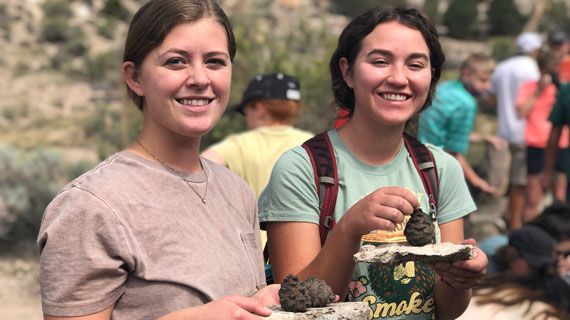Southern Paiute Rhetoric Class Teaches Native Culture
Posted: January 25, 2023 | Author: Abbie Cochrane | Read Time: 4 minutes
 Southern Utah University has always valued its surrounding area's history and diversity. The University offers a myriad of classes on culture, diversity, inclusion, and the like, and it just added another. The Southern Paiute and Native American Rhetoric class (ENGL 4160), taught by Dr. Julia Combs, is providing students with the unique opportunity to better understand the language and culture of the Southern Paiute people that reside in southern Utah.
Southern Utah University has always valued its surrounding area's history and diversity. The University offers a myriad of classes on culture, diversity, inclusion, and the like, and it just added another. The Southern Paiute and Native American Rhetoric class (ENGL 4160), taught by Dr. Julia Combs, is providing students with the unique opportunity to better understand the language and culture of the Southern Paiute people that reside in southern Utah.
“The real purpose of the class is to learn to listen rhetorically, to learn what kinds of communication are valuable to the group, and learn how to be better allies in their efforts to preserve their culture,” said Dr. Combs, English professor and director of SUU’s Writing Center. “To set aside biases and listen to what someone is saying and why they’re saying it. I think the students are really benefiting from this kind of cultural enrichment.”
The class was inspired by Dr. Combs’ grant-writing class when one of her students, Chase Redd, designed a project to republish the Southern Paiute children’s book, Why the Moon Paints Her Face Black by Eleanor Tom, a knowledge-keeper for the Southern Paiute tribe of Utah with illustrations by Southern Paiute children, with transcription by Chloe Brent Valentine.
SUU illustration major Zoe Petersen organized and carried out an illustration event in which Southern Paiute youth drew pictures that may potentially be featured into a children’s book similar to Why the Moon Paints Her Face Black.
The class was started to provide matching student funds for the grant written by Chase Redd. The grant was written to support Paiute Indian Tribe's efforts to preserve language and culture in a unique and hands-on way. Students from many respective fields are also part of the class, as one of the most-valued Southern Paiute beliefs is community and finding the similarities behind the differences. After all, the word “Paiute” translates to “of the people.”
Knowledge-keepers, or Elders, from the Southern Paiute tribe, are invited to the class to teach about their culture and their language, and each student’s job is to practice rhetorical listening–a way of critically thinking while remaining open to new ideas surrounding people, culture, and language.
“Everything I do in class is approved by the tribe. I am learning with the students as I facilitate the class,” Dr. Combs added. “My main focus with this class is what do the people of the Southern Paiute tribe want? I always make sure I know exactly what is okay to portray in class; for example, some Southern Paiute stories can only be told during certain times of the year, and some can’t be told at all. But that’s how they were meant to be shared–verbally. There’s value in hearing the story versus reading it–it’s an experience.”
Students are assigned papers, grant proposals, showcases, and hands-on projects and are responsible for their own learning in the class. One example of a student project is working to fund a second edition of Why the Moon Paints Her Face Black and giving the proceeds back to the tribe, as well as funding more knowledge-keepers to come to class. Another example is one of the daughters of the language speakers in the class who wants to record the story of her making a buckskin dress in the Southern Paiute language. There is even talk of getting another Southern Paiute children’s book titled Vivian and the Legend of the Hoodoos translated into Southern Paiute and equipped with a CD copy, telling the story in the language.
On top of all the projects and hands-on learning, students can become further enriched in Southern Paiute culture by attending events hosted by the people. Along with attending a pine nut roasting activity in Fremont Indian State Park and Museum, students were able to go to the Fall Gathering held at the SUU. These activities provide for a stronger connection between SUU and the Southern Paiute people, honor the sacred land on which the university was built, and keeping Southern Paiute culture alive.
“Part of rhetorical listening is to abandon your baggage when it comes to other people's stories and not sanitize them for your own sake,” said Dr. Combs. “Our job is to tell the stories the way the people the stories came from would want them told and, overall, understand all the ways they have been and are being told. Learning their values raises the question; what do you value?”
Another student project that the class has spearheaded is a movement to get a Native American Studies Minor approved at SUU. The student, Ali Allen Setoki, met with Dean Jean Boreen. With the help of her fellow students, she created a student survey to measure potential student interest in the minor. This is just one example of student projects inspired by the class to extend beyond the end of the semester.
Students interested in registering for the course should visit the SUU Course Catalog and search for ENGL 4160 - Special Topics in Rhetoric and Writing. The course will be part of a rotation schedule. Students who are interested can contact Dr. Combs.
This article was published more than 3 years ago and might contain outdated information or broken links. As a result, its accuracy cannot be guaranteed.

